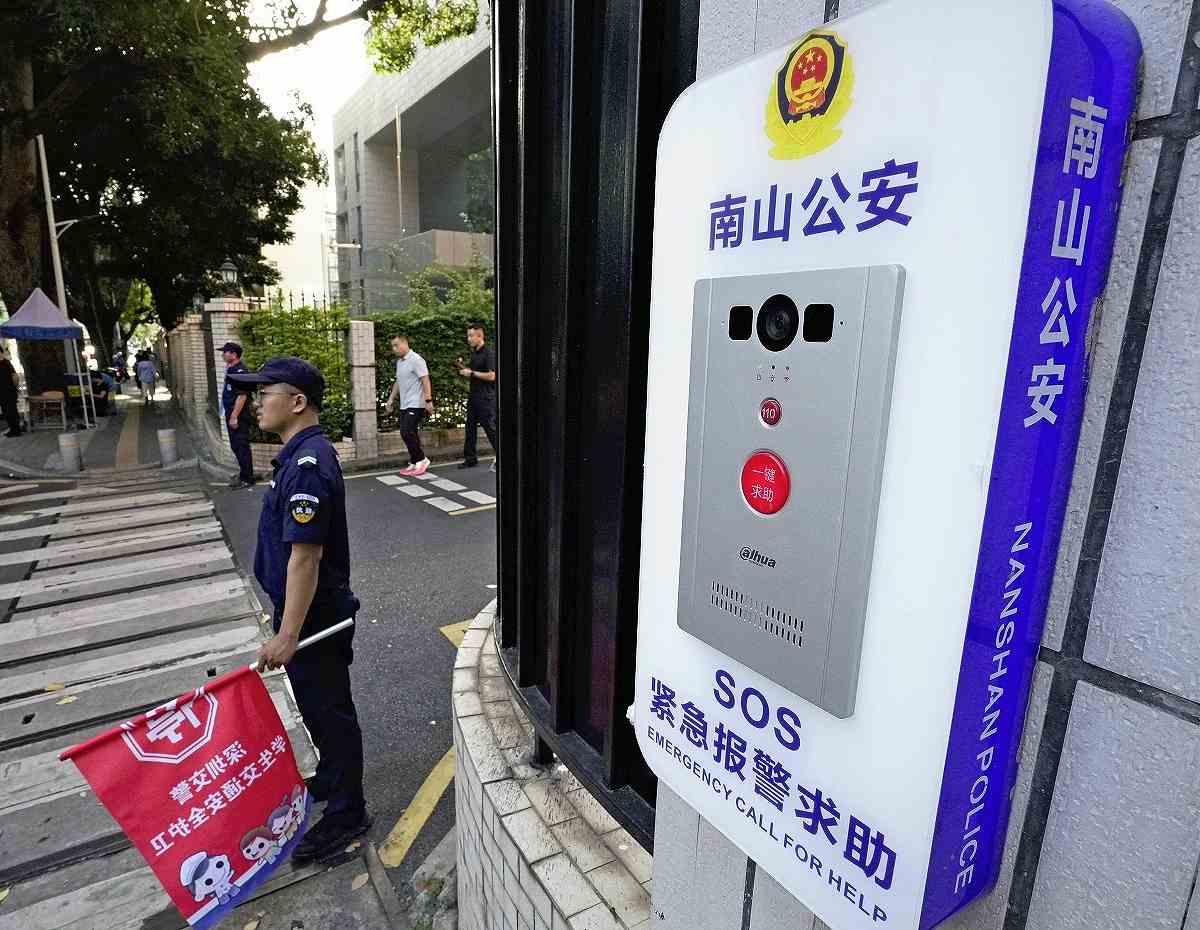Impacts of Japanese Boy’s Fatal Stabbing in China Still Being Felt, One Month On; Japan Continues to Press China for Information on Shenzhen Case

Security personnel stand guard as a car enters a Japanese school in Shenzhen, China, on Thursday.
17:30 JST, October 18, 2024
One month after a 10-year-old Japanese boy was fatally stabbed in Shenzhen, Guangdong Province, some Japanese companies are reviewing their stationing of employees in China, and members of the Japanese community remain worried that a similar incident could occur again.
On Sept. 18, a 44-year-old Chinese man stabbed the boy on a road near a Japanese school. The boy died the next day.
According to a source, the suspect may have become frustrated after struggling to find a job and targeted a Japanese person because he thought it would gain him more attention.
Keiichi Iwamoto, director general of the Foreign Ministry’s Consular Affairs Bureau, on Thursday met with Chinese Vice Foreign Minister Deng Li in Beijing and pressed the Chinese side to quickly reveal the full details of the incident and take steps to ensure the safety of Japanese expats there.
Chinese authorities have insisted the stabbing was an “isolated incident,” and no explanation about the assailant’s motive was provided at the meeting.
The incident has had an impact on economic activity by Japanese companies in China. According to a survey of 5,793 companies by Tokyo Shoko Research, Ltd., 157 of them have Japanese employees stationed in China. Since the stabbing, 93 of these companies have told their employees to take extra precautions. Three said they had urged family members of their employees to return to Japan, two have suspended transferring any more employees to China and one has, in principle, banned family members from accompanying employees there.
According to a source close to Chinese authorities with knowledge of the incident, the suspect reportedly had become disillusioned because his efforts to find a job had been unsuccessful. The source told The Yomiuri Shimbun that the suspect has admitted that he thought he “would gain attention if he committed some sort of major incident,” and that stabbing a Japanese person “would spark a huge reaction.” The suspect also allegedly said he thought some people would support him and that he looked online to find the Japanese school’s location.
According to the source, the man was not born in Guangdong Province and had been living in Dongguan, a city bordering Shenzhen, at the time of the incident. The shortest distance from the border of the two cities to the school is about 30 kilometers.
Shenzhen’s police authorities had announced that the man had no regular employment and revealed that he had damaged public telecommunications facility in Dongguan in 2015. However, his place of residence has not been disclosed.
Japanese community on edge

Security personnel stand guard as a car enters a Japanese school in Shenzhen, China, on Thursday.
The Chinese authorities’ failure to provide details about the suspect’s statements to investigators and other information has frustrated Japanese residents living in China.
More than 50 police officers and security personnel were standing guard near the Japanese school’s entrance before students started arriving Thursday morning. Some police officers were wearing bulletproof vests and holding shields, and police dogs were also present. Police vehicles with flashing red lights patrolled the area. Students have, in principle, been banned from walking to and from the school, which reopened Monday. Many of these children are now driven to school by their parents or caregivers.
“I’m still scared by what happened, so I’m grateful that these security measures are in place,” a Japanese woman whose son attends the school said. However, she also added, “I feel anxious because I don’t know anything about the background to the incident.”
Some observers have pointed out that amid a backdrop of such incidents, messages expressing anti-Japanese sentiment commonly appeared on social media. The Japanese side has been calling on China to crack down on these malicious posts.
According to the sources close to Chinese authorities, the slowdown in China’s economy also appears to have been a factor behind the stabbing.
Dongguan, where the suspect likely lived, was one of China’s major manufacturing cities and is home to many migrant workers, who line the city streets from the early morning seeking day-labor jobs. However, a 47-year-old man who had worked at a factory until three years ago said finding work there had become harder. “Many factories closed down because business was slow,” the man lamented. “I want a steady job, but many employers restrict job applicants to people aged 45 and under.”
The source said Chinese authorities were “concerned” that business investment might drop if any information that unsettled foreigners was publicized.
The suspect in an attack that injured people including a Japanese woman and her child in Suzhou, Jiangsu Province, in June also was an unemployed man. According to sources familiar with Japan-China relations, the perpetrator was not born in that city and had become frustrated with society, but authorities have not announced whether Japanese people were specifically targeted.

According to Iwamoto, the Chinese side has indicated a willingness to provide an explanation for the Shenzhen incident at “an appropriate time” in line with judicial proceedings. However, the paucity of information has left many Japanese expats and their families feeling unsettled.
“The cause [of this stabbing] should be made clear to us,” said a man whose children attend a Japanese school in Guangdong Province.
Top Articles in Society
-

Producer Behind Pop Group XG Arrested for Cocaine Possession
-

Man Infected with Measles Reportedly Dined at Restaurant in Tokyo Station
-

Man Infected with Measles May Have Come in Contact with Many People in Tokyo, Went to Store, Restaurant Around When Symptoms Emerged
-

Woman with Measles Visited Hospital in Tokyo Multiple Times Before Being Diagnosed with Disease
-

Australian Woman Dies After Mishap on Ski Lift in Nagano Prefecture
JN ACCESS RANKING
-

Producer Behind Pop Group XG Arrested for Cocaine Possession
-

Japan PM Takaichi’s Cabinet Resigns en Masse
-

Man Infected with Measles Reportedly Dined at Restaurant in Tokyo Station
-

Israeli Ambassador to Japan Speaks about Japan’s Role in the Reconstruction of Gaza
-

Videos Plagiarized, Reposted with False Subtitles Claiming ‘Ryukyu Belongs to China’; Anti-China False Information Also Posted in Japan























